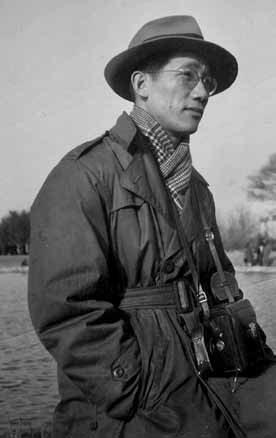by Susie Ling, Editor
In this special issue of Gum Saan Journal, we are honored to collaborate with writer Russell C. Leong to celebrate the life of his father, Charles L. Leong 梁普礼, a pioneering journalist. In this year of the 100th anniversary of Charles’ birth, we memorialize the tenacity of the Chinese American. Charles writes about “several deep stabs into my spirit and belief in the equality of the American system”. But he continued, his career spanning fifty years in America, China, and Chinatown. He became “rich in being Chinese American.”
For fifty years, Charles L. Leong was an English-language news reporter, editor, publisher, and author. Charles was born on 4 Sept 1911 in San Francisco, and grew up in Pajaro in Monterey County. His parents were from Xinhui 新会, Guangdong. He was a graduate of Watsonville High School (1930), San Jose State College, and Stanford University with an M.A. in Journalism. The first Asian member of the San Francisco Press Club, Leong was co-founder, with William Hoy, of the Chinese Press, an English-language paper for Chinese Americans between 1940 and 1952.1 He worked also with the San Francisco Chronicle, Chinese News, Young China, Hokubei Mainichi, Asian Week, and United Press. He served with the Flying Tigers in World War II. He was married to Mollie Jow Chun and had two sons, Russell (1950) and Eric (1953). Leong was a San Francisco Chinatown civic leader who was active with the Cathay Post, the Chinese Chamber of Commerce, and other organizations. Leong died on 23 February 1984 in San Francisco.

Photo courtesy of the Leong Family.
CHSSC’s 44th anniversary theme was “Giving Voice to the Community,” and Russell Charles Leong was given our 2019 Golden Spike Award.2 Daniel Mayeda, one of the stalwarts of the Asian Pacific American Media Coalition and East West Players, said in his introduction of Russell:
Dr. Don Nakanishi, the former Director of UCLA’s Asian American Studies Center, said “Russell Leong arguably has been the most influential and significant individual in the field of Asian American studies because of what he accomplished as the Senior Editor of Amerasia Journal.” Russell Leong was the main force behind Amerasia Journal between 1977 and 2010. But not only is Russell a technical and visionary editor, he is also a teacher. Imagine how lucky his creative writing students were at UCLA and at Hunter College, CUNY. Current UCLA Asian American Studies Director, Dr. Karen Umemoto, said, “Russell is one person who hasn’t aged in the forty years I’ve known him, which is actually pretty sickening since I’m younger but now look older.” She also said, “Russell is always speaking truth to power with his subtle but sharp pen to keep us awake, thinking.” Los Angeles Times said of Russell’s award-winning book, Phoenix Eyes, “A collection of startling and unsettling short stories.” A man of deep sensitivities and high standards, we honor professor and poet, Russell Leong.
On that evening, Russell talked about his parents and “dangerous words”:
In a manner of speaking, words are dangerous, because they can move people and communities toward their better, or their lesser, selves. This is why the Chinese Historical Society of Southern California, in recognizing the community of Chinese American writers, journalists, and editors, ia also recognizing the power of words to reclaim history, to transform our thinking, and to help to give voice, body and form to our community…
So tonight, I reflect and pay homage to my parents as pioneers, who also “laid down the golden spike” in their very own ways, one tap, one foot at a time. For them, and for all of you, I’ve penned this short poem that reflects my thinking today.
“Dangerous Words”
Words are dangerous creatures.
They can imprison or impoverish you.
But they can also reclaim and rescue you.
Words can rejoice and revolutionize
Words are radical to the root.
We, you and me, are responsible for our words.
We walk wherever we talk, and we must:
Because, as you’ve probably heard,
Real words are an endangered species:
Real words are dangerous.

____________________
1 It was first named “California Chinese Press.” See H. Mark Lai’s “Chinese American Press,” in Sally Miller, editor’s The Ethnic Press in the United States (1987).
